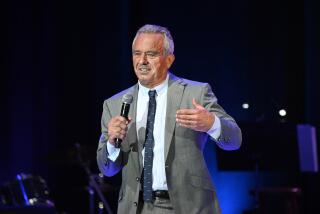Lawyers Evaluate Censure of Merck
- Share via
Jurors continued deliberating Friday in the latest Vioxx trial as some legal experts said Merck & Co.’s defense against thousands of similar lawsuits would be hurt by an accusation that company scientists had downplayed the pain reliever’s heart attack risk.
A rare “expression of concern” posted online Thursday by New England Journal of Medicine editors chastised Merck scientists for failing to report three nonfatal heart attacks among Vioxx users who were at low risk of cardiac problems.
The editors said two scientists employed by Merck knew about the three heart attacks more than four months before the journal published an article by the scientists about a Vioxx study conducted in 2000. The editors said they determined that information about the heart attacks had been deleted two days before the article was submitted.
The editors also said the three heart attacks would have led to different conclusions about the risk of Vioxx, particularly among users who were not predisposed to heart problems.
Merck representatives did not return calls Friday. The company issued a statement Thursday saying the heart attacks had been reported after a cutoff date for data for the study. Merck also said it promptly disclosed the three heart attacks to the Food and Drug Administration, as well as in a news release.
Merck withdrew the drug from the market in September 2004. The company faces more than 6,500 lawsuits that blame Vioxx for heart attacks, strokes and deaths. Analysts have estimated the litigation could cost Merck $50 billion.
The journal’s disclosure came after testimony ended in the third Vioxx trial. The case went to a federal court jury in Houston late Thursday.
U.S. District Judge Eldon Fallon met with attorneys in his chambers Friday amid reports that the plaintiff had asked for a mistrial based on the new information. Fallon, who has placed the attorneys under a gag order, would not disclose what was discussed. Neither side would say whether a mistrial was being sought.
Jurors were scheduled to resume deliberations today over whether Vioxx caused the fatal heart attack of a Florida man in 2001.
Attorneys for other plaintiffs said they were anxious to present the new information to jurors.
“We can tell every single juror that the prestigious New England Journal ... [said] that they were all fooled, misled and betrayed by Merck,” said Tom Girardi, a Los Angeles attorney representing plaintiffs in hundreds of Vioxx cases.
The journal’s statement is powerful because the source is a respected publication that usually stands above the fray, legal experts said.
“It puts Merck in a rather bad light,” said New York University law professor Stephen Gillers.
Jeff Cooper, an Illinois lawyer whose firm has filed about 75 Vioxx cases, said the medical journal’s statement was the type of evidence that bolstered plaintiffs’ requests for punitive damages.
“It is real, real trouble for Merck,” Cooper said. “There is no way that they can walk into a courtroom now and say, ‘Hey, we’ve been completely honest about this drug and what it does to people.’ ”
But defense lawyers said the journal’s disclosure might not be the bombshell plaintiffs’ attorneys hoped it would be.
“If Merck acts on it and cleans up the information, then maybe they can turn this into a positive,” said Peter Bicks, a corporate defense lawyer in New York who is not involved in the Vioxx litigation.
Merck shares fell 55 cents to $29.13 on Friday, the first day of trading after the journal issued its statement.
Analysts said investors already had absorbed so much negative Vioxx information that the statement did not rattle the market.
“We’ve already priced in most of the bad news,” said Arthur Hogan, chief market analyst at Jeffries & Co.
More to Read
Sign up for Essential California
The most important California stories and recommendations in your inbox every morning.
You may occasionally receive promotional content from the Los Angeles Times.











